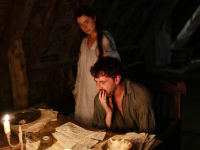
 English singer-songwriter and the son of a diplomat, Ed Harcourt has been releasing solo records since the year 2000. With Furnaces he releases perhaps his most fully realised album yet. Operating outside of the mainstream, Harcourt has developed without commercial restrictions and has a loyal following. His music has been getting harder edged over the years and whilst this Flood produced cracker may not make national radio, it demands your attention.
English singer-songwriter and the son of a diplomat, Ed Harcourt has been releasing solo records since the year 2000. With Furnaces he releases perhaps his most fully realised album yet. Operating outside of the mainstream, Harcourt has developed without commercial restrictions and has a loyal following. His music has been getting harder edged over the years and whilst this Flood produced cracker may not make national radio, it demands your attention.
Mostly performed by Ed alone, with some contributions from other musicians, the album is one of those that opens with a short, vocally-assisted essentially instrumental piece, Intro. It’s elegiac and soothing, a contrast to much of what is to follow. The World Is On Fire’ sets the scene for what follows. The drums boom in underpinning echoed brooding vocals, fiery destruction, hopelessness, grim prophecy, the cold that follows the fiery destruction and perspective about our place in the scheme of things. A floaty, icy synth props up the track, as fire and ice settle in as another theme. Ed, as always, had a way with a sweet pop melody and cosy love song, and that trait seems a million miles away from where he is now. Loup Garou’ is a more guitar and percussion driven song, where mythical themes are woven into Ed’s mindset (the loup-garou is a French legend of a shape-shifting human who is able to turn into a wolf at will). It’s a powerful, foreboding, melodious track, classic heavy Ed Harcourt. Title track Furnaces is a brass pinned, driving on the beat, rock track. The sound is cluttered, creating a sense of unease, even panic. It’s a hymn to the destruction that big businesses bring to the natural world.
Occupational Hazard sees Ed hovering almost victoriously over the destruction he leaves in the path of his life, whilst warning potential victims to keep away. It’s uncannily like a classic turn of the century Depeche Mode track. Nothing But A Bad Trip is an obvious “English Tom Waits” moment that has littered Ed’s career. A comparison that is unfair to both of these inspirational and individual artists. “Opened my mouth / The scream that came out was not even human / Got back on the horse / Rode away for a fix of destruction” is the album’s lyrical content boiled down to a core. Some comfort is offered in You Give Me More Than Love,  in which a lover is revered as a saviour who lines the path to better days with Augustan poetry. Yet the song is not wrapped in sugary sentiment in the way Ed has done with his sweetest love songs in the past. There’s still a heaviness, a danger present. Dionysus describes battles with alcohol; “Poor Dionysus / You drank yourself under the table again” is a clever lyrical play, linking Greek mythology (Dionysus is the Greek God of Wine) with modern day drinking issues. The song has a soft piano melody that gets swept up, but is followed by a thundery percussive orchestral swell as the battle is essentially depicted as hopeless.
in which a lover is revered as a saviour who lines the path to better days with Augustan poetry. Yet the song is not wrapped in sugary sentiment in the way Ed has done with his sweetest love songs in the past. There’s still a heaviness, a danger present. Dionysus describes battles with alcohol; “Poor Dionysus / You drank yourself under the table again” is a clever lyrical play, linking Greek mythology (Dionysus is the Greek God of Wine) with modern day drinking issues. The song has a soft piano melody that gets swept up, but is followed by a thundery percussive orchestral swell as the battle is essentially depicted as hopeless.
There Is a Light Below is an odd, upbeat song, living above an almost drum and bass beat, with wonderful multi-tracked vocals, but the mood is still not victorious. Defiant maybe, but domineering and threatening. The Last of Your Kind crashes in on a joyful melody. A modern Britpop anthem, where Harcourt sings of hope in the moments before the end of the world, as the last good man is left standing. Immoral, though, reduces hope from a personal level. ‘I will break your spirit / I will break your heart / Put it back together / Then slowly pull it apart’ is offered as a final solution. It’s a great track, but short on relief. The album ends with Antartica, as the singer retreats to the barren wasteland of ice in order to escape the misery and destruction of the world that pains him so. It is a call for the good, a new beginning – albeit one where withdrawing from the world into a desert of ice is the most promising solution on offer to the world’s maladies.
So this is a heavy album, weighty at every turn, cramped with pain and fear. It’s also intricate, extremely well planned out, a crystal vision; a career high point. Here’s hoping Ed Harcourt is making music for us for a much longer time to come. (Also out soon is Ed’s second collaboration with Sophie Ellis Bextor on her second post-modern LP.)

Author: Ian, Romford store





